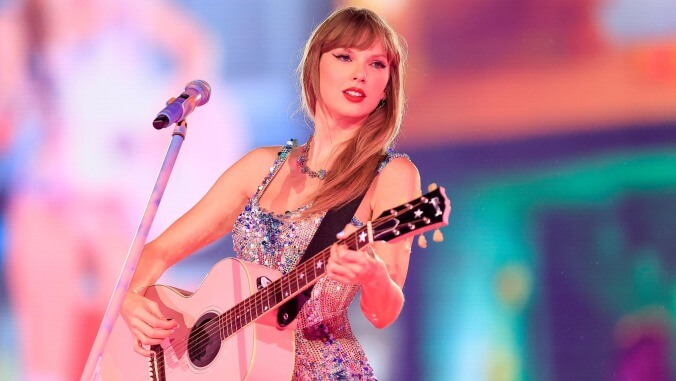Taylor Swift Photo: Buda Mendes/TAS23/Getty Images for TAS Rights Management
When it comes to cancel culture, it seems like there are two different worlds. There’s the real one, where everyday people live, in which words and actions have regular-sized consequences. Then there’s the celebrity world, apparently ruled by McCarthy-esque forces wielding pitchforks, eagerly waiting to ruin powerful peoples’ lives. Never mind that few people have actually materially had their lives “ruined” by a public backlash, and the few who arguably have (Harvey Weinstein, Bill Cosby) faced what could be categorized as justifiable legal consequences. Yet even celebrities of ostensibly upstanding character live in fear of cancelation—even the biggest stars in the world, like Taylor Swift. On Wednesday, she was named Time’s Person of the Year, despite having once been “canceled within an inch of my life and sanity,” as she puts it.
She refers to the infamous leaked conversation between herself and Kanye West in 2016, which Swift now describes as “a fully manufactured frame job, in an illegally recorded phone call, which Kim Kardashian edited and then put out to say to everyone that I was a liar.” The leak, on the so-called “National Snake Day,” sparked a worldwide “#TaylorSwiftIsOver” trend and put an aggressive end to the uncomplicated success she enjoyed in the wake of 1989, which Swift calls “an imperial phase.”
Being the subject of such an overwhelming, concentrated hate campaign had an undeniable effect on Swift personally, as she’s spoken to over the years. “A mass public shaming, with millions of people saying you are quote-unquote canceled, is a very isolating experience,” the singer said in 2019. “When you say someone is canceled, it’s not a TV show. It’s a human being. You’re sending mass amounts of messaging to this person to either shut up, disappear, or it could also be perceived as, Kill yourself.”
Now, to Time, she reiterates, “That took me down psychologically to a place I’ve never been before. I moved to a foreign country. I didn’t leave a rental house for a year. I was afraid to get on phone calls. I pushed away most people in my life because I didn’t trust anyone anymore. I went down really, really hard.” The demonstrable psychological effect of bullying from the media (social or otherwise) is fair enough. But Swift also says her cancellation felt like a “career death.” She declares, “Make no mistake—my career was taken away from me.”
Except… was it? As Time’s Sam Lansky points out—to the reader, if not to Swift herself in the moment—her first single after the scandal (“Look What You Made Me Do”) was a number-one chart hit. Her next album (Reputation) sold over a million copies in its first week, at the time second only to 1989. That album spawned a record-breaking stadium tour that spawned a critically acclaimed Netflix concert film. She was not banned, boycotted, or censored in any measurable way, and she’s only gone on to reach yet more dizzying career heights, reaching peaks of fame and success that are beyond possibly any other figure in popular culture, ever.
So no, Swift’s career doesn’t seem at any point to have been “taken away.” She was bullied, harassed, and treated unfairly. But she largely retained her fanbase, kept her wealth, and maintained her record deal (she did lose the rights to her albums, but that’s a separate story and one where she similarly comes out on top). If being canceled means suffering from admittedly egregious online hate, then Swift qualifies. If being canceled means suffering actual career setbacks, it’s hard to argue that it’s something Swift experienced.
Does it matter that Swift says she was canceled even when she wasn’t? Perhaps not, Lansky argues, at least within Swiftieism: “The point is: she felt canceled. She felt as if her career had been taken from her.” Those feelings, reality-based or not, have affected how Swift conducts her career today. “Nothing is permanent,” she says. “So I’m very careful to be grateful every second that I get to be doing this at this level because I’ve had it taken away from me before.”
But maybe it matters to the ongoing debate about “cancel culture” and whether it even exists. Words should mean something, and if one of the most successful, powerful entertainers in the world can claim to have been “canceled” without any viable proof, maybe being “canceled” doesn’t really mean anything after all. The preoccupation by Swift and other high-profile people with cancelation reflects the way those people equate success with being liked, or maybe being adored. Celebrity requires support, and having that support threatened may very well feel like one’s livelihood is at stake.
Luckily for all of us who enjoy her work, Swift’s livelihood is, and was, just fine. But Hollywood is still struggling to understand what true accountability looks like, and the public is still struggling with how best to hold powerful people accountable. And so we continue to live in two very separate worlds: the public with their hashtags, throwing pebbles at giants, and the powerful tilting at windmills, obsessed with a concept that doesn’t really exist. Nobody was canceled and everything hurt.


 Keep scrolling for more great stories from A.V. Club.
Keep scrolling for more great stories from A.V. Club.